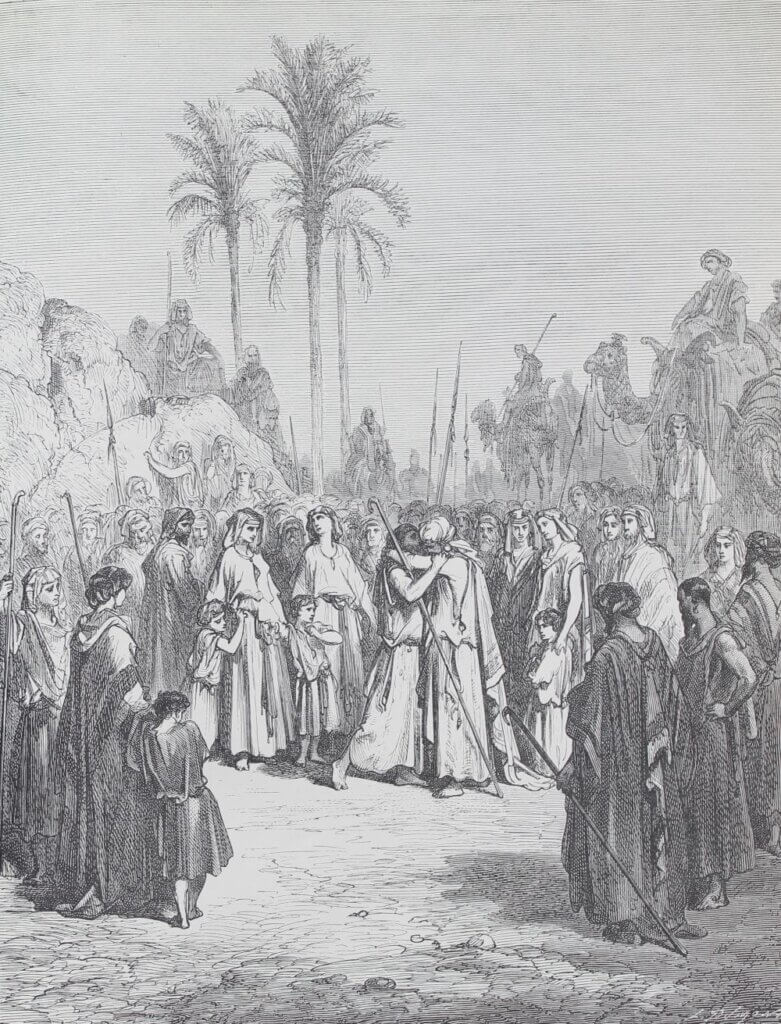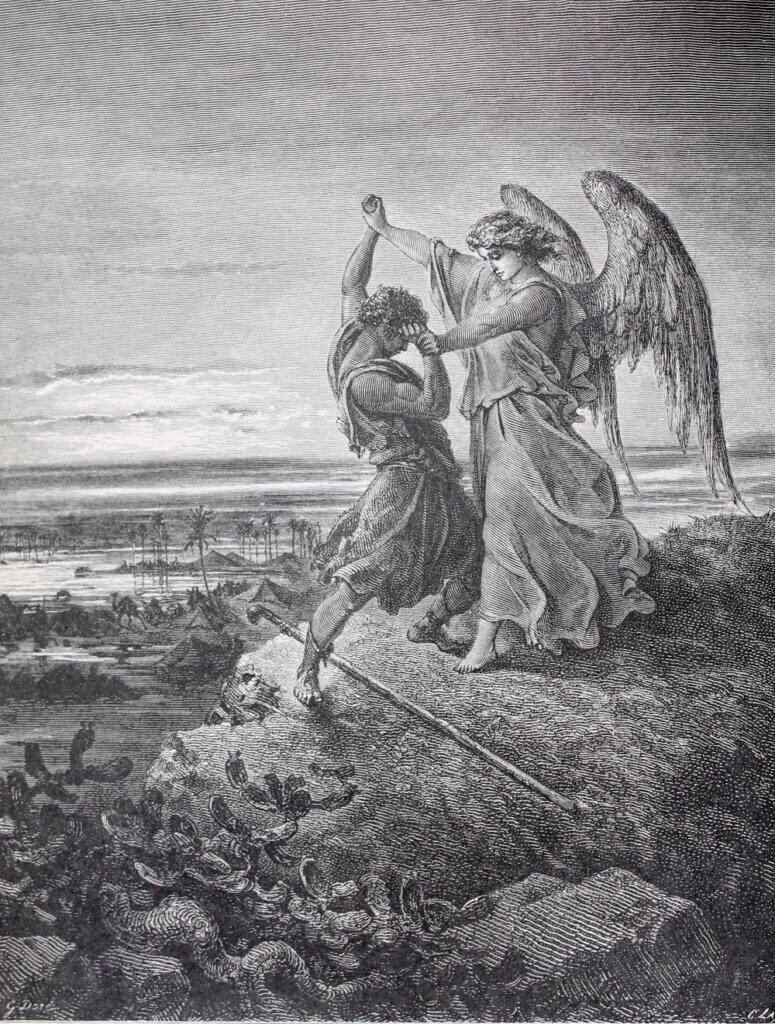
The re-encounter of Esau and Jacob is about hatred and how to deal with it. As is often said, hatred is no more or less than the opposite of love. In love, we cannot live, or be for one moment without the beloved. In hatred, it is the same. It forever occupies our mind and thoughts. We can only think of revenge, harm, sorrow or pain, even though we might realize that this hatred could also bring about our own demise.
There is however a fundamental difference between love and hatred. In love, a person can wake up and discover that all emotions have dissolved for no apparent reason. In hatred, this is rarely the case. Hatred can only be diminished if one ceases to provide fuel to the hatred. For this reason, it is much more dangerous, because it can bring a man to a point of no reason.
The story described in Genesis 32 and 33 relates the encounter of Jacob with Esau his brother that occurs twenty years after he, Jacob, usurped Esau’s birthright and soon after left his parents’ home for fear of retribution. In the midst of this event there is the extraordinary episode when Jacob struggles with 'an angel' and his name in changed to Israel. What is the connection?
During those twenty years, after the incident of Jacob’s Ladder, Jacob married Rachel and Leah and served his father-in-law Laban, where he accumulated children, wives and concubines. Meanwhile Esau too had accumulated wealth and wives, but still harbored hatred towards his brother because of the incident of the birthright.
If we examine the story from a gematrical perspective, we see that it is an ancient-day version of “Star Wars,” of Luke Skywalker's confrontation with his father Darth Vader, where the forces of evil combat the force of good. It is not that Esau was evil, but rather that evil had eaten into his heart.
And the messengers returned to Jacob saying, we came to thy brother Esau and also, he cometh to meet thee, and four hundred men with him. The Jacob was greatly afraid and distressed (Gen. 32:7-8).
Jacob shuddered when hears that 400 men were coming because he realizes that Esau is coming to not only to kill his body but to kill his soul, for indeed Jacob had reached the level of the 400, the highest spiritual level achievable on this earthly plane when he set the altar at Beth El in the story of Jacob's Ladder. Jacob’s response is to appease Esau’s attack by sending:
that which came to his hand a present for Esau his brother. Two hundred female goats, and twenty male goats, two hundred ewes, and twenty rams: Thirty milch camels with their colts, forty cows, and ten bulls, twenty female asses, and ten foals (Gen. 32:14-16).
Two aspects are of interest in this passage: one is the phrase ‘which came to his hand’ and the other is the number of livestock presented to Esau.
The phrase ‘which came to his hand’ (min haba b’yado in Hebrew מן הבא בידו) implies that the livestock selected to give to Esau was not calculated from an economic perspective i.e. ‘how much should I give him to appease him’ but rather from an inner voice. It is that inner voice that each and every one of us have, whether we take note of it or not. It comes from the heart and tells us to turn left rather than turn right; to go or not to go. It is the inner force that connects with an external force that leads us to take critical paths in our lives and make critical decisions that affect our lives. In the case of Jacob, we can assume this inner voice to be the voice of God, or of the angel with whom he fought. That ‘which came to his hand’ determines the number of animals sent as a gift to Esau. And if we add these up, including the colts of the camels, it totals 580.
| Jacob’s gifts to Esau | |
| She-goats | 200 |
| Goats | 20 |
| Ewes | 200 |
| Rams | 20 |
| Milch camels | 30 |
| And their colts | 30 |
| Cattle | 40 |
| Bulls | 10 |
| She-asses | 20 |
| Foals | 10 |
| Total | 580 |
The reasons Jacob sent 580 animals as a gift to Esau are threefold:
- The number 580 is the value of the word Seir, spelled sin-ayin-yod-resh שעיר = 300+70+10+200 =580. Seir is the name of the place where Esau resides. So, by presenting 580 animals, Jacob caused Esau to return to Seir: So, Esau returned on that day on his way unto Seir (Gen.33:16);
- Seir is also the word in Hebrew for a ‘goat’ commonly given as a sin offering at the Temple. . Moreover, as we note in the Lev, 17:7, Seir also implies demon, again implying that Jacob’s gift of 580 animals was in order to neutralize the hatred in Esau’s heart.
- The number 580 is the gematrical value of saraf שרף meaning ‘burn’ and spelled sin-resh-peh = 300+200+80=580. It is also the gematrical value of the shofar שפר shin-peh-resh= 300+80+200=580 which is the ram’s horn used to announce the end of the complete year and the beginning of another at Rosh Hashanah.So, by presenting the 580 animals, Jacob tried to conclude the matter of the birthright, allowing a new era to begin.
Following the sending of gifts to Esau, Jacob still fears for his life. We then encounter the extraordinary story when, after night has fallen, Jacob crosses a stream called the Jabbok:
And Jacob was left alone; and there wrestled a man with him until the breaking of the day (Gen. 32:25).
Finally, Jacob prevails over the man and demands to be blessed: And he (the man) said: Thy name shall no longer be Jacob, but Israel: for as a prince thou hast power with God and with men, and hast prevailed (Gen. 32:29).

The name of the stream ‘Jabbok יבק spelled yod-beth-koof is derived from the verb y’abek, meaning ‘struggle’ or ‘wrestle’, and is spelled: yod-aleph-beth-koof and is associated with the word abbok, אבק meaning ‘matter’ spelled, aleph-beth-koof. Hence the struggle that Jacob had was effectively a struggle over ‘matter’ i.e. the physical body (of Esau).
Who this man is, we do not know. The implications are that he was a godly figure, for Jacob is given the name Israel because of his power with God and with men. Also, after the event he named the place Peniel פניאל meaning face (פנ) of God (אל ) in Hebrew:
And Jacob called the name of the place Peniel; for I have seen God face to face, and my life is preserved (Gen. 32:31).
The word ‘face’ in fact appears a total of eight times in this episode. Face, spelled פן peh-nun = 80+50 = 130 which is a decane above 13 and suggests the presence of a conscious form of God. So clearly the episode of Jacob’s encounter with Esau was under the protection of God to ensure Jacob came to no harm.
This is why, when Jacob about 100 years later is lying on his deathbed and is at the point of blessing Ephraim and Manasseh, he says:
The Angel who redeemed me from all evil, bless the lads (Ephraim and Manasseh)(Gen. 48:16), suggesting that the 'man' with whom he struggled was indeed an Angel sent by God. Some rabbinical scholars suggest that the Angel was in fact the ‘prince of Esau’ i.e. the (positive) essence of Esau who had turned to evil. So, when Jacob finally comes face to face with Esau, he says: for therefore I have seen thy face as if I have seen the face of God (Gen. 33:10).
This becomes a little clearer if we examine the names ‘Jacob’ and ‘Israel’. Returning to the passage: Thy name shall no longer be Jacob, but Israel: for as a prince thou hast power with God and with men, and hast prevailed (Gen. 32:29). The name Israel is derived from the word ‘prince’, sar, and ‘God,’ el, as implied in the passage above. However, the change of name has further implications:
Israel ישראל is spelled yod-sin-resh-aleph-lamed = 10+300+200+1+30=541
Jacob יעקב is spelled: yod-ayin-koof-beth = 10+70+100+2=182
The difference between the two: i.e. Israel minus Jacob = 541-182=359, is the value for Satan שטן = sin-tet-nun=300+9+50=359.
The word Satan in Hebrew does not mean ‘devil’ in the English sense, but ‘adversary’ or ‘disturber’. It is this essence which causes one to take perverse action. In the case of Esau, it was his determination to kill his brother guided by Satan which, had he been successful, would have resulted in a dramatically different history of the Hebrew race.
Not only this, but if we take the name Esau עשו spelled ayin-sin-vav 70-300-6 = 376 and subtract it from Satan שטן = 359, we get 17. As we know, 17 is the gematrical value for ‘good’ – טוב tov in Hebrew spelled tet-vav-beth= 9+6+2=17. And as previously noted, ‘good’ does not necessarily mean good, but rather change from something that appears to be negative and destructive to something which is positive and constructive. Consequently, because the Angel changed Jacob’s name to Israel, Jacob was able to absorb and neutralize the evil that was in Esau, turning Esau’s evil inclination into good.
Jacob effectively rendered Esau powerless at the time of the meeting that was to take place the following day and turned “a bite into a kiss”: And Esau ran to meet him, embraced him and fell on his neck and kissed him (Gen.: 33:4).
If one looks carefully at the text in a Hebrew Bible, one will note that the ancient scribes have sequenced the phrase ‘and he kissed’, va yishaku, וישקהו with a series of dots over the letters.

As mentioned in the introduction to this book, nothing in the Bible appears without a reason and even the smallest dot has significance. In this instance the reason is as follows: in Hebrew the word for ‘kiss’ is nashek, נשק spelled nun-shin-koof. It is closely associated with the word for ‘bite’ nashech נשך spelled nun-shin-caph, where the last letter koof is replaced by a caph. Hence it is said that when Esau fell on Jacob’s neck, it was his intention to ‘bite’ him, but because he was rendered powerless by the submission of Satan in the change of Jacob’s name, so the evil was neutralized and the bite became a ‘kiss’. It is for this reason the dots are found over the word va yishaku.
The enmity between Esau and Jacob is never resolved. Even though in Deuteronomy 23:8 it says: ‘You shall not loathe the Edomite (Esau became the father of the Edomites) because he is your brother’ in the Book of Obadiah it says:
And the house of Jacob shall be a fire, and the house of Joseph a flame, and the house of Esau stubble, and they shall burn them and consume them; and none shall remain of the house of Esau; for the Lord has spoken it. (Obadiah 1:18).
Unfortunately, this position still persists today!
However, this text demonstrates that it is possible to change evil intentions into good; yin into yang; negative into positive. How this may be achieved is indicated in the analysis above - by eliminating the flame that fuels hatred until it is powerless and eventually replacing the negative emotion with gratitude and love.